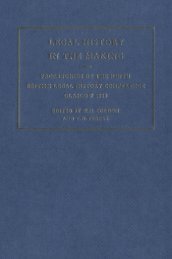130. - Collection Point® | The Total Digital Asset Management System
130. - Collection Point® | The Total Digital Asset Management System
130. - Collection Point® | The Total Digital Asset Management System
You also want an ePaper? Increase the reach of your titles
YUMPU automatically turns print PDFs into web optimized ePapers that Google loves.
200 Structure and the Book ofZechariah<br />
\NS*\ "3i> p[*7] must be considered, whether we accept the usual emendation<br />
or not, vv. 7,11. We should also bear in mind the »w» in 14.21. J<br />
npb is used in conjunction with *?pa in vv. 7 and 10. We should<br />
probably also consider inao which is also used similarly, cf. v. 10:<br />
'And I took my staff, Grace, and I broke it', and which has a similar<br />
sound to npto. rip 1 ? and "?pD may be linked because of their common<br />
consonants. <strong>The</strong> verb is also used with 'the thirty pieces of silver',<br />
v. 13, and the implements of a worthless shepherd, v. 15. Thus, in<br />
this chapter all references may be taken to be connected with<br />
leadership under Yahweh's authority.<br />
D*:0 and in« do not seem to be significant here.<br />
top occurs in 11.7 (2x); 13.9. No correspondence is apparent: 'Call<br />
one "Grace"...', 'Call upon my name...'<br />
DM and *73n occur simply where they have to occur, vv. 7 (2x), 10,<br />
14. We should consider them along with *?pa and so on.<br />
"iro, vv. 8, 9 (2x), 16, is a fairly rare word (nowhere else in<br />
Zechariah and only 28 times elsewhere in the OT). <strong>The</strong> participial<br />
forms mrDjm and nnrom are distinctive and both contexts relate to<br />
the shepherds' lack of care for the sheep.<br />
vfrt, 11.8, 12, 13; 13.8, 9. It is difficult to know how, if at all, these<br />
are to be related: 'destroyed three shepherds', 'thirty pieces of silver'<br />
(2x), 'the third which remains' (2x). We should probably plot it but<br />
not expect much from it. See below on «]03.<br />
tfEU and ma occur twice each in a single verse (8 and 9, respectivel<br />
and may be ignored.<br />
*?D« plus "ifen, vv. 9, 16, must be considered. <strong>The</strong> phrase is used of<br />
the sheep who devour the flesh of one another and of the worthless shepherd<br />
who devours the flesh of the fat ones of the flock. See TD above.<br />
jna, vv. 10, 14. See rip 1 ? above.<br />
~ns, vv. 10, 11, 14, belongs with ina, which it interprets.<br />
fTD is used with nna in v. 10, but with the meaning 'be cm off in<br />
13.8. It may be ignored.<br />
Dtf only occurs in 11.10 and 13.9, but the contexts are worth considering.<br />
<strong>The</strong> first is the striking phrase 'covenant with all the peoples', 2<br />
1. Since it is unlikely that we shall reach agreement on the interpretation of this<br />
phrase, I propose to operate with it as an algebraic variable for as long as possible.<br />
2. BHS proposes reading nun, but without manuscript support. We cannot<br />
accept this, even though it is difficult to understand the MT. Baldwin takes it to refer






